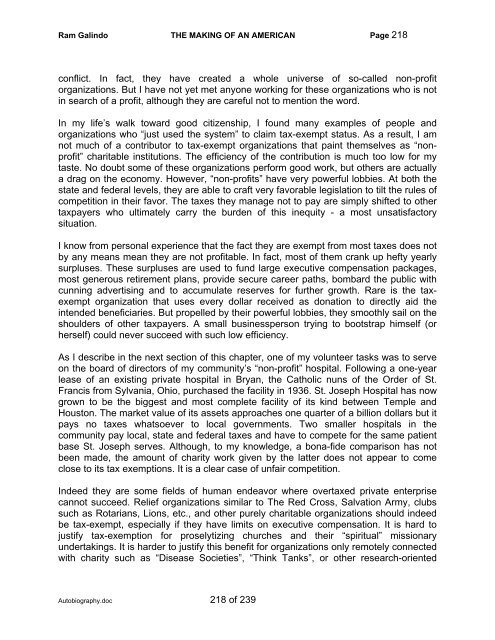Autobiography - The Galindo Group
Autobiography - The Galindo Group
Autobiography - The Galindo Group
You also want an ePaper? Increase the reach of your titles
YUMPU automatically turns print PDFs into web optimized ePapers that Google loves.
Ram <strong>Galindo</strong> THE MAKING OF AN AMERICAN Page 218<br />
conflict. In fact, they have created a whole universe of so-called non-profit<br />
organizations. But I have not yet met anyone working for these organizations who is not<br />
in search of a profit, although they are careful not to mention the word.<br />
In my life’s walk toward good citizenship, I found many examples of people and<br />
organizations who “just used the system” to claim tax-exempt status. As a result, I am<br />
not much of a contributor to tax-exempt organizations that paint themselves as “nonprofit”<br />
charitable institutions. <strong>The</strong> efficiency of the contribution is much too low for my<br />
taste. No doubt some of these organizations perform good work, but others are actually<br />
a drag on the economy. However, “non-profits” have very powerful lobbies. At both the<br />
state and federal levels, they are able to craft very favorable legislation to tilt the rules of<br />
competition in their favor. <strong>The</strong> taxes they manage not to pay are simply shifted to other<br />
taxpayers who ultimately carry the burden of this inequity - a most unsatisfactory<br />
situation.<br />
I know from personal experience that the fact they are exempt from most taxes does not<br />
by any means mean they are not profitable. In fact, most of them crank up hefty yearly<br />
surpluses. <strong>The</strong>se surpluses are used to fund large executive compensation packages,<br />
most generous retirement plans, provide secure career paths, bombard the public with<br />
cunning advertising and to accumulate reserves for further growth. Rare is the taxexempt<br />
organization that uses every dollar received as donation to directly aid the<br />
intended beneficiaries. But propelled by their powerful lobbies, they smoothly sail on the<br />
shoulders of other taxpayers. A small businessperson trying to bootstrap himself (or<br />
herself) could never succeed with such low efficiency.<br />
As I describe in the next section of this chapter, one of my volunteer tasks was to serve<br />
on the board of directors of my community’s “non-profit” hospital. Following a one-year<br />
lease of an existing private hospital in Bryan, the Catholic nuns of the Order of St.<br />
Francis from Sylvania, Ohio, purchased the facility in 1936. St. Joseph Hospital has now<br />
grown to be the biggest and most complete facility of its kind between Temple and<br />
Houston. <strong>The</strong> market value of its assets approaches one quarter of a billion dollars but it<br />
pays no taxes whatsoever to local governments. Two smaller hospitals in the<br />
community pay local, state and federal taxes and have to compete for the same patient<br />
base St. Joseph serves. Although, to my knowledge, a bona-fide comparison has not<br />
been made, the amount of charity work given by the latter does not appear to come<br />
close to its tax exemptions. It is a clear case of unfair competition.<br />
Indeed they are some fields of human endeavor where overtaxed private enterprise<br />
cannot succeed. Relief organizations similar to <strong>The</strong> Red Cross, Salvation Army, clubs<br />
such as Rotarians, Lions, etc., and other purely charitable organizations should indeed<br />
be tax-exempt, especially if they have limits on executive compensation. It is hard to<br />
justify tax-exemption for proselytizing churches and their “spiritual” missionary<br />
undertakings. It is harder to justify this benefit for organizations only remotely connected<br />
with charity such as “Disease Societies”, “Think Tanks”, or other research-oriented<br />
<strong>Autobiography</strong>.doc 218 of 239


